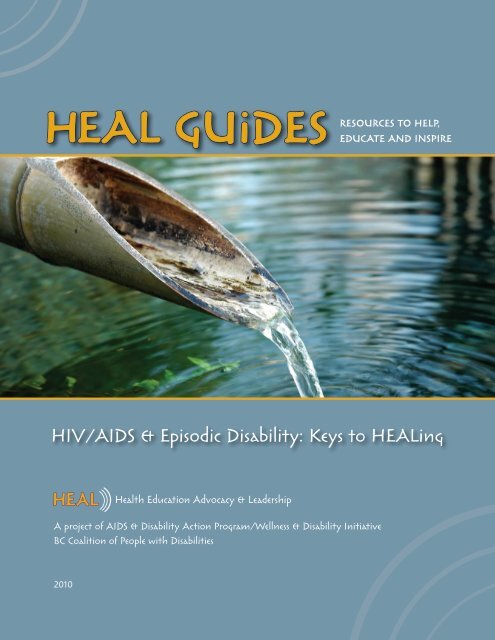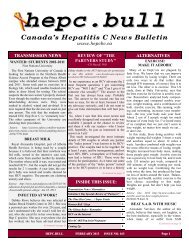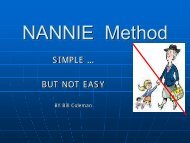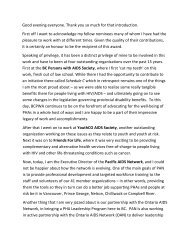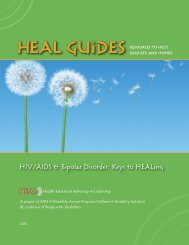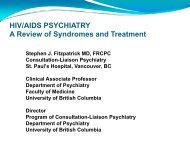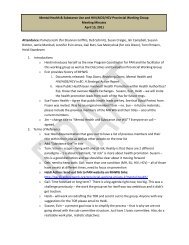HIV/AIDS & Episodic Disability: Keys to HEALing - bccpd
HIV/AIDS & Episodic Disability: Keys to HEALing - bccpd
HIV/AIDS & Episodic Disability: Keys to HEALing - bccpd
Create successful ePaper yourself
Turn your PDF publications into a flip-book with our unique Google optimized e-Paper software.
HEAL Guides<br />
resources<br />
<strong>to</strong> help,<br />
EDUCATE and inspire<br />
<strong>HIV</strong>/<strong>AIDS</strong> & <strong>Episodic</strong> <strong>Disability</strong>: <strong>Keys</strong> <strong>to</strong> <strong>HEALing</strong><br />
HEAL<br />
Health Education Advocacy & Leadership<br />
A project of <strong>AIDS</strong> & <strong>Disability</strong> Action Program/Wellness & <strong>Disability</strong> Initiative<br />
BC Coalition of People with Disabilities<br />
2010
HEAL Guides | <strong>HIV</strong>/<strong>AIDS</strong> & <strong>Episodic</strong> <strong>Disability</strong> | Page 2<br />
< Back <strong>to</strong> Table of Contents<br />
HEAL Guide No. 4<br />
<strong>HIV</strong>/<strong>AIDS</strong> & <strong>Episodic</strong> <strong>Disability</strong>: <strong>Keys</strong> <strong>to</strong> <strong>HEALing</strong><br />
The HEAL Guides Series<br />
The HEAL (Health Education, Advocacy and Leadership) framework is a crossdisability,<br />
self-advocacy approach developed by the BC Coalition of People<br />
with Disabilities (BCCPD).<br />
Through education, advocacy and personal leadership (recognizing and sharing<br />
skills, experience and encouragement) people with disabilities discover<br />
new strengths, passions and possibilities. This creates a ripple effect in<strong>to</strong> the<br />
relationships and communities around us.<br />
HEAL is a path <strong>to</strong> empowerment and our Guides are intended <strong>to</strong> “help, educate<br />
and inspire” readers <strong>to</strong> explore their unique <strong>HEALing</strong> path. For information<br />
about HEAL and other HEAL Guides, visit the BC Coalition of People with<br />
Disabilities website at http://www.<strong>bccpd</strong>.bc.ca or contact us (please see page<br />
3 for contact details).<br />
How <strong>to</strong> use this HEAL Guide<br />
HEAL Guides provide information from experts and researchers, as well as<br />
people living with chronic health issues and disabilities. They offer a selection<br />
of “keys:” facts, research findings, experiences, perspectives and insights<br />
about living with a disability or a combination of disabilities or health conditions.<br />
Most keys are one paragraph or two at most. You can begin with any key that<br />
interests you or read the Guide from beginning <strong>to</strong> end.<br />
The source for most keys can be found in parentheses at the end of the paragraph.<br />
To read more about each key, find the source in the Resources section<br />
at the end of this Guide. Additional helpful articles, books and websites are<br />
included. If you are reading this Guide on your computer, the links provided<br />
throughout are live and can be used <strong>to</strong> jump <strong>to</strong> listed resources.<br />
BC Coalition of People with Disabilities<br />
Wellness & <strong>Disability</strong> Initiative
HEAL Guides | <strong>HIV</strong>/<strong>AIDS</strong> & <strong>Episodic</strong> <strong>Disability</strong> | Page 3<br />
< Back <strong>to</strong> Table of Contents<br />
Disclaimer<br />
While considerable care and effort have been taken in gathering and summarizing<br />
the information included in this HEAL Guide, it may have become<br />
outdated since publication. HEAL Guides offer a brief and selected overview<br />
of research and perspectives on health <strong>to</strong>pics <strong>to</strong> encourage discussion and<br />
participation in your health care, in consultation with your professional care<br />
provider. A recurring theme in HEAL Guides is the complex and personal balance<br />
that creates wellness. Your health care providers play an essential role<br />
and should always be consulted before making changes that may alter the<br />
balance for you.<br />
Acknowledgements<br />
HEAL Guides are published by the Health Education, Advocacy and Leadership<br />
project of the BC Coalition of People with Disabilities.<br />
Writer & Project Direc<strong>to</strong>r: Shelley Hours<strong>to</strong>n • Edi<strong>to</strong>r & Designer: Ann Vrlak<br />
Funding provided by the Provincial Health Services Authority.<br />
For more on HEAL, visit us at www.<strong>bccpd</strong>.bc.ca, under Programs.<br />
BC Coalition of People with Disabilities<br />
204-456 W. Broadway, Vancouver, BC V5Y 1R3<br />
Tel 604-875-0188 • TTY 604-875-8835<br />
Fax 604-875-9227 • Toll Free 1-877-232-7400<br />
email: wdi@<strong>bccpd</strong>.bc.ca<br />
BC Coalition of People with Disabilities<br />
Wellness & <strong>Disability</strong> Initiative
HEAL Guides | <strong>HIV</strong>/<strong>AIDS</strong> & <strong>Episodic</strong> <strong>Disability</strong> | Page 4<br />
< Back <strong>to</strong> Table of Contents<br />
In This Guide<br />
Things We Know....................... 5<br />
What is an <strong>Episodic</strong> <strong>Disability</strong>?...............5<br />
Examples of <strong>Episodic</strong> Disabilities ............5<br />
<strong>HIV</strong> as an <strong>Episodic</strong> Illness.......................6<br />
<strong>Episodic</strong> Framework for <strong>HIV</strong>..................6<br />
Fatigue Common and Debilitating.........7<br />
Fatigue Important for Assessors..............8<br />
Fatigue and Employment Link...............8<br />
Fatigue and Other Chronic Illnesses.........8<br />
Fatigue Unacknowledged........................8<br />
Things That Help....................... 9<br />
Managing <strong>HIV</strong>-related Fatigue...............9<br />
Self-care Tips..........................................9<br />
Uncertainty and Perception of Illness......9<br />
Support in Managing Uncertainty....... 10<br />
Mindfulness Eases Uncertainty............. 10<br />
Meditation as Self Care......................... 10<br />
Ups and Downs................................... 10<br />
Neuroplasticity and the Brain...............11<br />
Benefit Finding.....................................11<br />
Stress................................................... 12<br />
Stress and Substance Use...................... 12<br />
Stress Management and <strong>HIV</strong>............... 12<br />
Reducing Stress with Exercise................ 12<br />
Massage Therapy..................................13<br />
Complementary Medicine.....................13<br />
Stress of Stigma....................................13<br />
Stigma Leads <strong>to</strong> Depression...................13<br />
Stigma in the Community.................. 14<br />
Stigma and Ageism............................. 14<br />
Spirituality.......................................... 14<br />
Building Self-esteem............................. 14<br />
Friendships and Support........................15<br />
Self-advocacy........................................15<br />
Resources................................. 16<br />
BC Coalition of People with Disabilities<br />
Wellness & <strong>Disability</strong> Initiative
HEAL Guides | <strong>HIV</strong>/<strong>AIDS</strong> & <strong>Episodic</strong> <strong>Disability</strong> | Page 5<br />
< Back <strong>to</strong> Table of Contents<br />
Things We Know<br />
Living with <strong>HIV</strong> is living with uncertainty, and never knowing when illness will set<br />
in, and never knowing when discrimination will be encountered.<br />
–Canadian <strong>AIDS</strong> Society and Canadian Working Group on <strong>HIV</strong> &<br />
Rehabilitation. <strong>HIV</strong> as an <strong>Episodic</strong> Illness: Revising the CPP(D) Program<br />
³³What is an <strong>Episodic</strong> <strong>Disability</strong>?<br />
“An episodic disability is marked by fluctuating periods and degrees of wellness<br />
and disability that are unpredictable. As a consequence, a person may<br />
move in and out of the labour force in an unpredictable manner.” (Canadian<br />
Working Group on <strong>HIV</strong> & Rehabilitation. Report on the National Summit)<br />
³³Examples of <strong>Episodic</strong> Disabilities<br />
“<strong>Episodic</strong> disabilities include (but are not limited <strong>to</strong>) conditions such as multiple<br />
sclerosis, chronic fatigue syndrome, fibromyalgia, irritable bowel syndrome,<br />
colitis, Crohn’s disease, premenstrual syndrome, interstitial cystitis,<br />
endometriosis, migraine headaches, environmental sensitivities, lupus, epilepsy,<br />
asthma, osteoarthritis, diabetes, cystic fibrosis, heart disease, chronic pain<br />
syndromes, musculoskeletal conditions, hepatitis C, cancer, <strong>HIV</strong>/<strong>AIDS</strong>, learning<br />
disorders and psychiatric conditions.” (Banks and Kaschak; Canadian Working<br />
Group on <strong>HIV</strong> & Rehabilitation (CWGHR) referenced in Lightman et al.)<br />
BC Coalition of People with Disabilities<br />
Wellness & <strong>Disability</strong> Initiative
HEAL Guides | <strong>HIV</strong>/<strong>AIDS</strong> & <strong>Episodic</strong> <strong>Disability</strong> | Page 6<br />
< Back <strong>to</strong> Table of Contents<br />
³³<strong>HIV</strong> as an <strong>Episodic</strong> Illness<br />
There are three fac<strong>to</strong>rs that define <strong>HIV</strong> as an “episodic illness:”<br />
• despite advances in treatment, people with <strong>HIV</strong> will experience periods<br />
of illness “due <strong>to</strong> physical and psychosocial fac<strong>to</strong>rs that will require<br />
them <strong>to</strong> withdraw from the workforce, and make reintegration difficult”<br />
• many people are able <strong>to</strong> return <strong>to</strong> work for varying lengths of time<br />
despite periods of illness<br />
• the experience of illness and wellness varies from person <strong>to</strong> person, is<br />
related <strong>to</strong> the disease and treatment, and is unpredictable.<br />
(Canadian <strong>AIDS</strong> Society and Canadian Working Group on <strong>HIV</strong> and<br />
Rehabilitation)<br />
³³<strong>Episodic</strong> Framework for <strong>HIV</strong><br />
A Canadian study published in 2008 explored episodic disability among men<br />
and women living with <strong>HIV</strong>, generating the “episodic disability framework.”<br />
The framework includes three elements:<br />
• the “dimensions of episodic disability”<br />
• the “context in which disability is experienced”<br />
• triggers that initiate an episode of disability<br />
(O’Brien et al.)<br />
Dimensions of <strong>HIV</strong> <strong>Disability</strong><br />
There are four “dimensions of <strong>HIV</strong> disability.” When one or more of these<br />
dimensions changes, the other dimensions are also affected.<br />
• symp<strong>to</strong>ms or side-effects of treatment, including stress, anxiety and<br />
depression as well, as low self-esteem, shame, fear and loneliness<br />
• difficulties associated with day-<strong>to</strong>-day activities<br />
• barriers <strong>to</strong> social inclusion in various roles (parent, work/school, per-<br />
sonal relationships and other social roles/activities)<br />
• uncertainty that varies on a daily basis and over the course of the ill-<br />
ness<br />
(O’Brien et al.)<br />
BC Coalition of People with Disabilities<br />
Wellness & <strong>Disability</strong> Initiative
HEAL Guides | <strong>HIV</strong>/<strong>AIDS</strong> & <strong>Episodic</strong> <strong>Disability</strong> | Page 7<br />
< Back <strong>to</strong> Table of Contents<br />
Context–Fac<strong>to</strong>rs Affecting the Experience of <strong>Disability</strong><br />
Participants in the <strong>Episodic</strong> <strong>Disability</strong> Framework study talked about the<br />
impact of extrinsic (or external) fac<strong>to</strong>rs and intrinsic (or internal) fac<strong>to</strong>rs.<br />
Extrinsic fac<strong>to</strong>rs included stigma and social support from friends, family, pets,<br />
partners, community, health care providers, etc. “Stigma resulted from discrimination<br />
from friends, family, work colleagues, employers and health care<br />
providers due <strong>to</strong> a participant’s <strong>HIV</strong> status, their sexual orientation, ethnocultural<br />
background, employment status, and/or gender.” Intrinsic or internal<br />
fac<strong>to</strong>rs were personal characteristics (age, additional health challenges, etc.)<br />
and “living strategies” or behaviours and attitudes used <strong>to</strong> cope with <strong>HIV</strong>.<br />
(O’Brien et al.)<br />
Triggers of <strong>HIV</strong> <strong>Disability</strong><br />
Episodes of disability followed one or more “triggers.” Examples provided<br />
by the participants include “receiving an <strong>HIV</strong> diagnosis; starting or changing<br />
antiretroviral medications; experiencing a serious illness; and suffering a loss<br />
of others” (friends, neighbours, partners, family members). (O’Brien et al.)<br />
How <strong>to</strong> Use the <strong>Episodic</strong> <strong>Disability</strong> Framework<br />
Researchers suggest that health care providers use the framework <strong>to</strong> “structure<br />
their thinking about the dimensions of <strong>HIV</strong>-related disability,” specifically<br />
in less-commonly unders<strong>to</strong>od areas, such as the challenge of living with uncertainty.<br />
People living with <strong>HIV</strong> can use the framework <strong>to</strong> become more proactive<br />
in managing their health and reducing negative impacts where possible.<br />
(O’Brien et al.)<br />
³³Fatigue Common and Debilitating<br />
Fatigue is one of the most common and debilitating symp<strong>to</strong>ms of <strong>HIV</strong>, occurring<br />
in up <strong>to</strong> 98 percent of people with the diagnosis. Researchers report<br />
that fatigue causes people <strong>to</strong> s<strong>to</strong>p working, restrict activities with family and<br />
friends, and often require “an entire day <strong>to</strong> get through the simplest of household<br />
chores.” Employment and daily activities are even more difficult because<br />
of the “lowered motivation, difficulty concentrating and increased drowsiness”<br />
that accompany <strong>HIV</strong>-related fatigue.” (Harmon et al.)<br />
BC Coalition of People with Disabilities<br />
Wellness & <strong>Disability</strong> Initiative
HEAL Guides | <strong>HIV</strong>/<strong>AIDS</strong> & <strong>Episodic</strong> <strong>Disability</strong> | Page 8<br />
< Back <strong>to</strong> Table of Contents<br />
³³Fatigue Important for Assessors<br />
Service providers assessing level of disability, capacity for employment, and<br />
need for home support and other in-home assistance must be aware of the<br />
debilitating impact of <strong>HIV</strong>-related fatigue. (Harmon et al.)<br />
³³Fatigue and Employment Link<br />
A US study, completed in 2006, identified fatigue as “one of the most common<br />
and debilitating complaints of <strong>HIV</strong>-positive individuals, potentially leading<br />
<strong>to</strong> important functional limitations.” Those with lower levels of fatigue were<br />
employed, had higher income, had lived with an <strong>HIV</strong> diagnosis for a longer<br />
period of time and were receiving antiretroviral therapy. Participants who<br />
were employed from the beginning of the fifteen month study showed some<br />
improvement in their level of fatigue, while those who were unemployed did<br />
not. (Pence et al.)<br />
³³Fatigue and Other Chronic Illnesses<br />
Researchers note that people with a combination of <strong>HIV</strong> and other chronic<br />
illnesses are even more fatigued. The relationship between <strong>HIV</strong> and additional<br />
(comorbid) illnesses is becoming an important issue as people with <strong>HIV</strong> now<br />
live longer. Depression is a common comorbid illness for people living with<br />
<strong>HIV</strong> and the link between depression and fatigue is well established. (Harmon<br />
et al.)<br />
³³Fatigue Unacknowledged<br />
A 2006 Australian study also identified fatigue as a significant problem for<br />
people living with <strong>HIV</strong>. Researchers found that, in addition <strong>to</strong> the difficulty<br />
of coping with fatigue, “fatigue remains silent and invisible <strong>to</strong> participants’<br />
families, friends and employers.” Furthermore, fatigue was “met with a lack<br />
of acknowledgement and understanding from health professionals.” The<br />
researchers note that people living with the fatigue of <strong>HIV</strong> developed coping<br />
strategies by trial and error over time. (Jenkin et al.)<br />
BC Coalition of People with Disabilities<br />
Wellness & <strong>Disability</strong> Initiative
HEAL Guides | <strong>HIV</strong>/<strong>AIDS</strong> & <strong>Episodic</strong> <strong>Disability</strong> | Page 9<br />
< Back <strong>to</strong> Table of Contents<br />
Things That Help<br />
³³Managing <strong>HIV</strong>-related Fatigue<br />
Researchers interviewing people aged 50 and older with <strong>HIV</strong> found that they<br />
used a number of strategies for coping with fatigue. Participants felt their fatigue<br />
was caused by several fac<strong>to</strong>rs and that the level of fatigue was an indica<strong>to</strong>r<br />
of overall wellness. Strategies used included changes in diet, vitamins and<br />
prescription medications <strong>to</strong> address anemia and vitamin B12 and tes<strong>to</strong>sterone<br />
deficiencies, modifying routines, exercise, rest, and complementary and<br />
alternative medicine approaches, such as acupuncture, massage and herbal<br />
remedies. (Siegel et al.)<br />
³³Self-care Tips<br />
A US study of 359 people living with <strong>HIV</strong> found 776 self-care strategies for<br />
living with <strong>HIV</strong> and 526 sources of information about the strategies. Self-care<br />
tactics fell in<strong>to</strong> eight categories: “medications, self-comforting, complementary<br />
treatments, daily thoughts and activities, diet changing, help seeking,<br />
spiritual care and exercise.” Most of these techniques were seen as helpful by<br />
study participants. Sources of information about self-care strategies included<br />
self, health care providers, personal networks and community. (Chou et al.)<br />
³³Uncertainty and Perception of Illness<br />
“Illness uncertainty” or the unpredictability and episodic nature of an illness<br />
has been studied among people living with diabetes, Parkinson’s, multiple<br />
sclerosis, lupus and fibromyalgia. Illness uncertainty is described by researchers<br />
as encompassing four components: ambiguity, uncertainty, lack of information<br />
and unpredictability. Experiencing illness uncertainty leads <strong>to</strong> feeling<br />
less hope, as well as greater feelings of distress, anxiety, tension, anger and<br />
depression. Ultimately, illness uncertainty makes us feel less able <strong>to</strong> cope with<br />
our illness. (Johnson et al.)<br />
BC Coalition of People with Disabilities<br />
Wellness & <strong>Disability</strong> Initiative
HEAL Guides | <strong>HIV</strong>/<strong>AIDS</strong> & <strong>Episodic</strong> <strong>Disability</strong> | Page 10<br />
< Back <strong>to</strong> Table of Contents<br />
³³Support in Managing Uncertainty<br />
There is a “clear link between social support and efforts <strong>to</strong> manage high levels<br />
of uncertainty over issues such as unpredictable disease progression, experimental<br />
medications, and ambiguous symp<strong>to</strong>ms.” Social support networks<br />
help by providing information, emotional support, a safe place <strong>to</strong> vent feelings,<br />
and acceptance and validation; assisting in skill development; and, encouraging<br />
shifts in perspective. (Brashers et al.)<br />
³³Mindfulness Eases Uncertainty<br />
Mindfulness-based meditation which focuses on acceptance and living in the<br />
moment has been found <strong>to</strong> be helpful in coping with illness uncertainty and<br />
the perceived loss of control. “Mindfulness interventions develop the ability<br />
<strong>to</strong> recognize negative thoughts, feelings, and sensations ... as momentary<br />
aspects of awareness … [and] …also promote greater emotional clarity.”<br />
(Johnson et al.)<br />
³³Meditation as Self Care<br />
Dr. Michael McGee at Harvard Medical School describes meditation as a “practice<br />
of psychological weightlifting.” Typically, those who meditate enjoy three<br />
immediate results: “increased discipline, regularization of one’s lifestyle and<br />
increased commitment <strong>to</strong> one’s own self care.” (McGee)<br />
³³Ups and Downs<br />
Meditation is also commonly used <strong>to</strong> treat depression, anger, anxiety, stress,<br />
hypertension, addiction, insomnia and chronic pain. “Meditation is a practice<br />
of concentration. As the ability <strong>to</strong> concentrate improves, patients may become<br />
more productive at tasks that require concentration, especially when<br />
fatigued or in pain.” (McGee)<br />
BC Coalition of People with Disabilities<br />
Wellness & <strong>Disability</strong> Initiative
HEAL Guides | <strong>HIV</strong>/<strong>AIDS</strong> & <strong>Episodic</strong> <strong>Disability</strong> | Page 11<br />
< Back <strong>to</strong> Table of Contents<br />
Researcher Mark Williams in the UK has been testing a treatment called<br />
mindfulness-based cognitive therapy (MBCT). MBCT combines ancient forms<br />
of meditation with modern cognitive behaviour therapy. One way that the<br />
treatment benefits people is helping them <strong>to</strong> live more in the moment, rather<br />
than being caught up in upsetting memories from the past or worries about<br />
the future. (University of Oxford News Release)<br />
³³Neuroplasticity and the Brain<br />
Neuroplasticity is the brain’s ability <strong>to</strong> rewire itself–“<strong>to</strong> grow new neural connections”<br />
as Elisha Goldstein describes it. Neuroplasticity enables us <strong>to</strong> create<br />
new connections and pathways in our thinking. Unfortunately, repeatedly<br />
responding <strong>to</strong> life events in negative ways is also reinforced each time we do<br />
it. Goldstein points out that bad news is more difficult <strong>to</strong> balance because “our<br />
brains are wired <strong>to</strong> look for danger and pay more attention <strong>to</strong> the unpleasant<br />
than the pleasant. If I were <strong>to</strong> pay you 10 compliments and then say something<br />
judgmental or critical, you are more likely <strong>to</strong> remember and ruminate<br />
about the judgment than the compliments.” This makes “mindfulness” even<br />
more important in maintaining some control over the new neural pathways<br />
we create. Read Goldstein’s fascinating blog, Mindfulness & Psychotherapy, for<br />
more information. (Goldstein)<br />
³³Benefit Finding<br />
Looking for positive aspects of a challenging situation is a way of coping with<br />
difficult life events and is called “benefit finding” by psychologists. Researchers<br />
have found that people who look for and recognize some of the positive<br />
effects or benefits of living with <strong>HIV</strong>/<strong>AIDS</strong> feel more optimistic and able <strong>to</strong><br />
manage challenges they face. Examples of some of the benefits identified<br />
include access <strong>to</strong> medical care and disability benefits following <strong>HIV</strong> diagnosis,<br />
better relationships with family and friends, improved coping skills, and improved<br />
eating habits and nutrition. (Littlewood et al.)<br />
BC Coalition of People with Disabilities<br />
Wellness & <strong>Disability</strong> Initiative
HEAL Guides | <strong>HIV</strong>/<strong>AIDS</strong> & <strong>Episodic</strong> <strong>Disability</strong> | Page 12<br />
< Back <strong>to</strong> Table of Contents<br />
³³Stress<br />
Successfully managing stress is important in living well with <strong>HIV</strong>/<strong>AIDS</strong>. Research<br />
in the US found that, among women living with <strong>HIV</strong>/<strong>AIDS</strong>, “mastery over stress”<br />
was linked <strong>to</strong> social support, spiritual perspective and the intensity of symp<strong>to</strong>ms<br />
at the time. Coping with illness-related stress was more difficult when interpersonal<br />
conflict was also an issue. (Gray and Cason)<br />
³³Stress and Substance Use<br />
The ongoing stress that comes with chronic health problems, stigma, low selfesteem<br />
and other challenges in life can lead many people <strong>to</strong> “self-medicate”–<br />
use alcohol, nicotine or recreational drugs for temporary relief. Substance<br />
misuse can trigger or worsen depression and seriously affect your <strong>HIV</strong>/<strong>AIDS</strong><br />
treatment regimen. Here <strong>to</strong> Help is an excellent starting point for information<br />
and support. Developed by BC Partners for Mental Health and Addictions Information,<br />
the website provides information in multiple languages (http://www.<br />
here<strong>to</strong>help.bc.ca). See also the HEAL Guide 3, <strong>HIV</strong>/<strong>AIDS</strong> & Substance Misuse: <strong>Keys</strong><br />
<strong>to</strong> <strong>HEALing</strong>.<br />
³³Stress Management and <strong>HIV</strong><br />
A study published in 2008 reviewed 35 stress management programs for people<br />
living with <strong>HIV</strong>/<strong>AIDS</strong>, including training in guided imagery, progressive muscle<br />
relaxation, interpersonal skills, medication and other aspects of living with <strong>HIV</strong><br />
and coping skills. Researchers found that these strategies reduced fatigue and<br />
improved mental health and quality of life. (Scott-Sheldon et al.)<br />
³³Reducing Stress with Exercise<br />
Exercise is commonly recommended <strong>to</strong> reduce stress and increase energy level,<br />
strength and muscle <strong>to</strong>ne. Discuss your exercise plan with your doc<strong>to</strong>r before<br />
beginning <strong>to</strong> ensure that your medications, physical health and current fitness<br />
level are considered. (Bopp et al.) For an overview of how <strong>to</strong> safely begin an exercise<br />
program for people living with <strong>HIV</strong>/<strong>AIDS</strong>, see Mooney and Vergel’s “Exercise:<br />
The Best Therapy for Managing Side Effects.”<br />
BC Coalition of People with Disabilities<br />
Wellness & <strong>Disability</strong> Initiative
HEAL Guides | <strong>HIV</strong>/<strong>AIDS</strong> & <strong>Episodic</strong> <strong>Disability</strong> | Page 13<br />
< Back <strong>to</strong> Table of Contents<br />
Recent studies also show that exercise reduces depression and depressionrelated<br />
fatigue in people with chronic illnesses by increasing their sense of<br />
achievement or mastery of physical exercise goals. (University of Illinois News<br />
Bureau)<br />
³³Massage Therapy<br />
Massage therapy has been found <strong>to</strong> improve overall quality of life and ability<br />
<strong>to</strong> cope with stress for people with <strong>HIV</strong>/<strong>AIDS</strong>, especially when combined with<br />
meditation or relaxation training. Researchers believe that massage therapy<br />
may also increase the body’s ability <strong>to</strong> fight <strong>HIV</strong>/<strong>AIDS</strong>. (Hillier et al.)<br />
³³Complementary Medicine<br />
Herbal remedies are a popular complementary and alternative medicine<br />
(CAM) option and are used by some people <strong>to</strong> treat depression. Although<br />
alternative medicines may seem safe because you can buy them over-thecounter<br />
without a prescription, it is extremely important that you discuss<br />
them with your doc<strong>to</strong>r. Herbal or natural remedies can interact with prescription<br />
medications (including those used <strong>to</strong> treat <strong>HIV</strong>/<strong>AIDS</strong>, depression, cancer,<br />
heart conditions, and seizures), in some cases making them less effective. (St.<br />
John’s Wort and Depression)<br />
³³Stress of Stigma<br />
Stigma, whether related <strong>to</strong> <strong>HIV</strong>, mental illness or other chronic health issues,<br />
sexual orientation, or poverty, causes extreme stress. For people living with<br />
<strong>HIV</strong>, stress has been linked <strong>to</strong> faster progression of the disease. (Cohen et al.)<br />
³³Stigma Leads <strong>to</strong> Depression<br />
The stigma surrounding <strong>HIV</strong> creates an enormous barrier <strong>to</strong> support and treatment.<br />
In fact, stigma has been found <strong>to</strong> lead <strong>to</strong> depression. (Vanable et al.)<br />
BC Coalition of People with Disabilities<br />
Wellness & <strong>Disability</strong> Initiative
HEAL Guides | <strong>HIV</strong>/<strong>AIDS</strong> & <strong>Episodic</strong> <strong>Disability</strong> | Page 14<br />
< Back <strong>to</strong> Table of Contents<br />
³³Stigma in the Community<br />
For people living in rural areas, stigma and discrimination are common in both<br />
community and health care settings. It can be especially difficult <strong>to</strong> cope with because<br />
of lack of alternative care providers, social isolation and lack of transportation<br />
and/or resources <strong>to</strong> travel for services. (Zukoski and Thorburn)<br />
³³Stigma and Ageism<br />
For older people, the burden of stigma may be made even greater by ageism–<br />
judgment and discrimination based on age. A study of <strong>HIV</strong>/<strong>AIDS</strong> in people over 50<br />
found that 68 percent of participants experienced both ageism and <strong>HIV</strong>-associated<br />
stigma. Researchers describe a “concept of double jeopardy” for this population.<br />
(Emlet)<br />
³³Spirituality<br />
According <strong>to</strong> researchers, spirituality or religiousness increases after people have<br />
been diagnosed with <strong>HIV</strong>. (Ironson et al. 2006) These individuals also experience<br />
less depression and hopelessness, have lower cortisol (stress hormone) levels,<br />
smoke less and practice safer sex. (Ironson et al. 2002)<br />
³³Building Self-esteem<br />
It can be very difficult <strong>to</strong> feel good about yourself when you are under the stress<br />
of having symp<strong>to</strong>ms that are hard <strong>to</strong> manage, when you are dealing with a disability,<br />
when you are having a difficult time or when others are treating you badly. At<br />
times like these, it is easy <strong>to</strong> be drawn in<strong>to</strong> a downward spiral of lower and lower<br />
self-esteem. Low self-esteem may also be a symp<strong>to</strong>m of depression. One thing<br />
you can do <strong>to</strong> help you feel good about yourself is <strong>to</strong> make a list of at least five of<br />
your strengths, for example, courage, friendliness or creativity. Next make a list of<br />
ten ways you could reward yourself that are free and not related <strong>to</strong> food or drink.<br />
Examples might include taking a walk in your favourite part of <strong>to</strong>wn or in the<br />
woods, enjoying a conversation with a good friend, and browsing at the library.<br />
When you feel that you need a lift, do one of the activities on your list. (Copeland.<br />
Building Self-esteem)<br />
BC Coalition of People with Disabilities<br />
Wellness & <strong>Disability</strong> Initiative
HEAL Guides | <strong>HIV</strong>/<strong>AIDS</strong> & <strong>Episodic</strong> <strong>Disability</strong> | Page 15<br />
< Back <strong>to</strong> Table of Contents<br />
³³Friendships and Support<br />
Maintaining friendships or making new friends can be extremely difficult when<br />
you are living with a chronic illness and stigma. Forming new relationships may<br />
be even more important for people needing <strong>to</strong> avoid old patterns and social<br />
connections linked with substance use. Making and Keeping Friends: A Self-help<br />
Guide by Mary Ellen Copeland offers excellent practical tips <strong>to</strong> get started finding<br />
new friends and maintaining friendships.<br />
³³Self-advocacy<br />
Living with one or more chronic health conditions means that there are times<br />
when you need <strong>to</strong> advocate for yourself. Becoming a good self-advocate will<br />
also help you when you need <strong>to</strong> advocate for others. Self-advocacy–protecting<br />
your rights and getting the information, care, or changes you need–can be<br />
especially difficult when stigma, depression and low self-esteem are involved.<br />
Effective self-advocacy involves organizational skills <strong>to</strong> focus and identify what<br />
you need, get the facts, plan a strategy and set goals. Good communication<br />
skills are needed <strong>to</strong> explain your situation and gather support from others, <strong>to</strong><br />
ask for what you want, and <strong>to</strong> assert yourself calmly. Learning self-advocacy<br />
strategies is well worth the effort and will help bolster your self-esteem and<br />
nurture patience–two essential ingredients for success. For practical step-bystep<br />
suggestions, see Mary Ellen Copeland’s Speaking Out for Yourself: A Selfhelp<br />
Guide.<br />
BC Coalition of People with Disabilities<br />
Wellness & <strong>Disability</strong> Initiative
HEAL Guides | <strong>HIV</strong>/<strong>AIDS</strong> & <strong>Episodic</strong> <strong>Disability</strong> | Page 16<br />
< Back <strong>to</strong> Table of Contents<br />
Resources<br />
For the source and additional information about the keys above, look for the<br />
author’s name or article title (which appears in parentheses in the keys) in the<br />
resource list below.<br />
The links in this Guide are live, so you can jump <strong>to</strong> the reference or website<br />
directly from the PDF on your computer.<br />
You can learn more about HEAL (Health Education, Advocacy, and Leadership)<br />
in BCCPD’s Transition magazine (Summer 2009) at: http://www.<strong>bccpd</strong>.bc.ca/<br />
transsummer09.htm.<br />
Banks, Martha E, and Ellyn Kaschak, eds. Women with Visible and Invisible Disabilities:<br />
Multiple Intersections, Multiple Issues, Multiple Therapies. [N.p.]: Haworth<br />
Press, 2003.<br />
Preview available at Google Books. http://tinyurl.com/yze8y4d<br />
BC NurseLine.<br />
Telephone Anywhere in BC: 8-1-1.<br />
TTY (Deaf and hearing-impaired): 7-1-1.<br />
Call 8-1-1 <strong>to</strong> speak <strong>to</strong> a registered nurse 24 hours/day 7 days/week about nonemergency<br />
health concerns.<br />
To speak <strong>to</strong> a pharmacist: call 8-1-1 for medication information between 5 pm<br />
<strong>to</strong> 9 am 7 days/week when your pharmacist may be unavailable.<br />
For nutrition advice, call 8-1-1 <strong>to</strong> speak with a dietitian.<br />
Translation services are available in over 130 languages on request. Say<br />
the name of your preferred language in English <strong>to</strong> be connected with an<br />
interpreter.<br />
BC Partners for Mental Health and Addictions Information. Here<strong>to</strong>Help. http://www.<br />
here<strong>to</strong>help.bc.ca (accessed March 7, 2010).<br />
A partnership of:<br />
Anxiety Disorders Association of BC; BC Schizophrenia Association; Canadian<br />
Mental Health Association, BC Division; Centre for Addictions Research of BC;<br />
FORCE Society for Kids’ Mental Health; Mood Disorders Association of BC.<br />
Access information in multiple languages. Publications include:<br />
BC School Resource Guide; Brochures; Fact Sheets; State of the Knowledge<br />
Papers; Toolkits; and Visions Journal.<br />
BC Coalition of People with Disabilities<br />
Wellness & <strong>Disability</strong> Initiative
HEAL Guides | <strong>HIV</strong>/<strong>AIDS</strong> & <strong>Episodic</strong> <strong>Disability</strong> | Page 17<br />
< Back <strong>to</strong> Table of Contents<br />
BC Persons with <strong>AIDS</strong> Society (BCPWA). http://www.bcpwa.org (accessed March 7,<br />
2010).<br />
Resources, support, events/news, advocacy, and more.<br />
Healthy Living Manual and Living+ Magazine.<br />
Bopp, Chris<strong>to</strong>pher M, Kenneth D Phillips, Laura J Fulk, and Gregory A Hand. “Clinical<br />
Implications of Therapeutic Exercise in <strong>HIV</strong>/<strong>AIDS</strong>.” Journal of the Association<br />
of Nurses in <strong>AIDS</strong> Care 14, no. 1 (January-February 2003): 73-78. http://tinyurl.<br />
com/yzt4h2s (accessed January 27, 2010).<br />
Brashers, D E, J L Neidig, and D J Goldsmith. “Social Support and the Management<br />
of Uncertainty for People Living with <strong>HIV</strong> or <strong>AIDS</strong>.” Abstract, Health<br />
Communication 16, no. 3 (2004): 305-331. http://tinyurl.com/ycapzk5<br />
(accessed February 11, 2010).<br />
Canadian <strong>AIDS</strong> Society and Canadian Working Group on <strong>HIV</strong> and Rehabilitation. <strong>HIV</strong><br />
as an <strong>Episodic</strong> Illness: Revising the CPP(D) Program: A Brief Prepared for the<br />
Sub-Committee on the Status of Persons with Disabilities. 2003. http://tinyurl.<br />
com/yfawzjs (accessed February 8, 2010).<br />
Canadian Mental Health Association. BC Division. http://www.cmha.bc.ca/ (accessed<br />
March 7, 2010).<br />
Source of information throughout BC on mental illness; mental wellness;<br />
support; advocacy; education; Visions Journal; Mind Matters E-news and more.<br />
A member of the Here<strong>to</strong>Help partnership.<br />
Canadian Working Group on <strong>HIV</strong> and Rehabilitation (CWGHR). <strong>Episodic</strong> Disabilities.<br />
http://tinyurl.com/y8mqnqh (accessed November 19, 2010).<br />
———. <strong>Episodic</strong> Disabilities Network. http://tinyurl.com/yeqmf94 (accessed<br />
November 19, 2010).<br />
———. Report on the National Summit on the <strong>Episodic</strong> Disabilities Project. http://<br />
tinyurl.com/ybkrlcv (accessed November 19, 2010).<br />
CATIE (Canadian <strong>AIDS</strong> Treatment Information Exchange). http://www.catie.ca<br />
(accessed March 7, 2010).<br />
Comprehensive and current information about prevention, treatment,<br />
living with <strong>HIV</strong>, news/events, and a direc<strong>to</strong>ry of provincial, national and<br />
international <strong>HIV</strong>/<strong>AIDS</strong> organizations.<br />
BC Coalition of People with Disabilities<br />
Wellness & <strong>Disability</strong> Initiative
HEAL Guides | <strong>HIV</strong>/<strong>AIDS</strong> & <strong>Episodic</strong> <strong>Disability</strong> | Page 18<br />
< Back <strong>to</strong> Table of Contents<br />
Chou, F Y, W L Holzemer, C J Portillo, and R Slaughter. “Self-care Strategies and<br />
Sources of Information for <strong>HIV</strong>/<strong>AIDS</strong> Symp<strong>to</strong>m Management.” Nursing<br />
Research 53, no. 5 (September-Oc<strong>to</strong>ber 2004): 332-39. http://www.ncbi.nlm.<br />
nih.gov/pubmed/15385870 (accessed Oc<strong>to</strong>ber 28, 2009).<br />
Cohen, Sheldon, Denise Janicki-Deverts, and Gregory E Miller. “Psychological Stress<br />
and Disease.” Journal of the American Medical Association 298, no. 14<br />
(Oc<strong>to</strong>ber 2007): 1685-1687. http://www.psych.ubc.ca/~healthpsych/jama%20<br />
2007.pdf (accessed January 25, 2010).<br />
Copeland, Mary Ellen. Building Self-esteem: A Self-help Guide. Rockville, MD: Center<br />
for Mental Health Services. Substance Abuse and Mental Health Services,<br />
[N.d.] http://tinyurl.com/yarb75u (accessed January 28, 2010).<br />
———. Making and Keeping Friends: A Self-help Guide. Rockville, MD: Center for<br />
Mental Health Services. Substance Abuse and Mental Health Services , [N.d.]<br />
http://tinyurl.com/ydvf4xr (accessed January 28, 2010).<br />
———. Speaking Out for Yourself: A Self-help Guide. Rockville, MD: Center for<br />
Mental Health Services. Substance Abuse and Mental Health Services, [N.d.]<br />
http://tinyurl.com/yg9r6ww (accessed January 28, 2010).<br />
Crisis Intervention and Suicide Prevention Centre of BC (Crisis Centre). http://www.<br />
crisiscentre.bc.ca/ (accessed March 7, 2010).<br />
Distress Line Phone Numbers:<br />
Greater Vancouver: 604-872-3311.<br />
Toll free–Howe Sound & Sunshine coast: 1-866-661-3311.<br />
BC-wide: 1-800-SUICIDE (744-2433).<br />
TTY 1-866-872-0113.<br />
Online service for youth: http://youthinbc.com/.<br />
Emlet, Charles A. “‘You’re Awfully Old <strong>to</strong> Have This Disease’: Experiences of Stigma<br />
and Ageism in Adults 50 Years and Older Living with <strong>HIV</strong>/<strong>AIDS</strong>.” Abstract,<br />
Geron<strong>to</strong>logist 46, no. 6 (December 2006): 781-790. http://tinyurl.com/yjqoozb<br />
(accessed January 29, 2010).<br />
Goldstein, Elisha. “Mindfulness Reduces Stress, Promotes Resilience.” Interview by<br />
Judy Lin. July 29, 2009. UCLA Today. http://tinyurl.com/yhwfo2p (accessed<br />
January 6, 2010).<br />
Gore-Fel<strong>to</strong>n, Cheryl, and Cheryl Koopman. “Behavioral Mediation of the Relationship<br />
between Psychosocial Fac<strong>to</strong>rs and <strong>HIV</strong> Disease Progression.” Psychosomatic<br />
Medicine 70 (June 2008): 569-574. http://tinyurl.com/ycrgzls (accessed<br />
February 7, 2010).<br />
BC Coalition of People with Disabilities<br />
Wellness & <strong>Disability</strong> Initiative
HEAL Guides | <strong>HIV</strong>/<strong>AIDS</strong> & <strong>Episodic</strong> <strong>Disability</strong> | Page 19<br />
< Back <strong>to</strong> Table of Contents<br />
Gray, J, and C L Cason. “Mastery of Stress among Women with <strong>HIV</strong>/<strong>AIDS</strong>.” Abstract,<br />
Journal of the Association for Nurses in <strong>AIDS</strong> Care 13, no. 4 (July-August<br />
2002): 43-51. http://tinyurl.com/yll342j (accessed February 11, 2010).<br />
Harmon, James L, Julie Barroso, Brian Wells Pence, Jane Leserman, and Naima<br />
Salahuddin. “Demographic and Illness-related Variables Associated with <strong>HIV</strong>related<br />
Fatigue.” Journal of the Association of Nurses in <strong>AIDS</strong> Care 19, no. 2<br />
(2008): 90-97. http://tinyurl.com/y8un5k4 (accessed January 10, 2010).<br />
HealthLinkBC. http://www.healthlinkbc.ca/ (accessed March 7, 2010).<br />
Dial 8-1-1 <strong>to</strong> speak <strong>to</strong> a nurse, pharmacist or dietitian.<br />
Open 24 hours/day 7-days/week.<br />
Hillier, Susan L, Quinette Louw, Linzette Morris, Jeanine Uwimana, and Sue Statham.<br />
“Massage Therapy for People with <strong>HIV</strong>/<strong>AIDS</strong>.” Cochrane Database of<br />
Systematic Reviews 2010, no. 1 (2010). http://tinyurl.com/yb3buzh (accessed<br />
January 27, 2010).<br />
“<strong>HIV</strong>/<strong>AIDS</strong> as an <strong>Episodic</strong> <strong>Disability</strong> in the Workplace.” Interagency Coalition on <strong>AIDS</strong><br />
and Development. http://tinyurl.com/yh2d28s (accessed February 11, 2010).<br />
Hours<strong>to</strong>n, Shelley. “Connecting with Your Community: A How-<strong>to</strong> Guide.” Transition,<br />
Winter 2009, 8-10. http://tinyurl.com/yhzj6ge (accessed March 5, 2010).<br />
Ironson, Gail, G F Solomon, E G Balbin, C O’Cleirigh, A George, M Kumar, et al. “The<br />
Ironson-Woods Spirituality/Religiousness Index Is Associated with Long<br />
Survival, Health Behaviors, Less Distress, and Low Cortisol in People with<br />
<strong>HIV</strong>/<strong>AIDS</strong>.” Abstract, Annals of Behavioral Medicine 24, no. 1 (Winter 2002):<br />
34-48. http://tinyurl.com/ykabnkz (accessed February 12, 2010).<br />
Ironson, Gail, Rick Stuetzle, and Mary Ann Fletcher. “An Increase in<br />
Religiousness/Spirituality Occurs After <strong>HIV</strong> Diagnosis and Predicts Slower<br />
Disease Progression over 4 Years in People with <strong>HIV</strong>.” Journal of General<br />
Internal Medicine 21, no. S5 (December 2006): S62-S68. http://tinyurl.com/<br />
ybeksls (accessed February 12, 2010).<br />
Jenkin, P, T Koch, and D Kralik. “The Experience of Fatigue for Adults Living with<br />
<strong>HIV</strong>.” Abstract, Journal of Clinical Nursing 15, no. 9 (September 2006): 1123-31.<br />
http://tinyurl.com/ydp3bx6 (accessed January 19, 2010).<br />
BC Coalition of People with Disabilities<br />
Wellness & <strong>Disability</strong> Initiative
HEAL Guides | <strong>HIV</strong>/<strong>AIDS</strong> & <strong>Episodic</strong> <strong>Disability</strong> | Page 20<br />
< Back <strong>to</strong> Table of Contents<br />
Job Accommodation Network (JAN). Accommodation Ideas for <strong>AIDS</strong>/<strong>HIV</strong>.<br />
Morgan<strong>to</strong>wn, WV: JAN, 2008. http://www.jan.wvu.edu/media/aids.htm<br />
(accessed February 12, 2010).<br />
Johnson, Lisa M, Alex J Zautra, and Mary C Davis. “The Role of Illness Uncertainty<br />
on Coping with Fibromyalgia Symp<strong>to</strong>ms.” Health Psychology 25, no. 6<br />
(November 2006): 696-703. http://tinyurl.com/ykqsjvu (accessed Oc<strong>to</strong>ber 2,<br />
2009).<br />
Lightman, Ernie, Andrea Vick, Dean Herd, and Andrew Mitchell. “‘Not Disabled<br />
Enough:’ <strong>Episodic</strong> Disabilities and the Ontario <strong>Disability</strong> Support Program.”<br />
<strong>Disability</strong> Studies Quarterly 29, no. 3 (2009). http://www.dsq-sds.org/article/<br />
view/932/1108 (accessed January 13, 2010).<br />
Littlewood, Rae A, Peter A Vanable, Michael P Carey, and Donald C Blair. “The<br />
Association of Benefit Finding <strong>to</strong> Psychosocial and Health Behavior<br />
Adaptation among <strong>HIV</strong>+ Men and Women.” Journal of Behavioral Medicine<br />
31, no. 2 (Oc<strong>to</strong>ber 2008): 145-155. http://tinyurl.com/ygacmak (accessed<br />
January 11, 2010).<br />
McClelland, Alex. “Healthy Living.” In Managing Your Health: A Guide for People<br />
Living with <strong>HIV</strong>. 27-52. Toron<strong>to</strong>, ON: CATIE, 2009. http://www.catie.ca/eng/<br />
MYH/ch4.shtml (accessed January 15, 2010).<br />
McGee, Michael. “Meditation and Psychiatry.” Psychiatry (Edgmont) 5, no. 1 (January<br />
2008): 28-41. http://tinyurl.com/yzajcvx (accessed February 11, 2010).<br />
McKee, Eileen. “Re-examining the Role of <strong>Episodic</strong> Disabilities In the Workplace.”<br />
CAPA (Canadian Arthritis Patient Alliance) Voices, Fall 2007. http://tinyurl.com/<br />
yfkl77w (accessed February 11, 2010).<br />
Mental Health Information Line.<br />
Telephone 1-800-661-2121.<br />
Vancouver: 604-669-7600.<br />
Provides taped information on provincial mental health programs as well as<br />
symp<strong>to</strong>ms, causes, treatment, support groups and publications relating <strong>to</strong> a<br />
number of mental illnesses. Operates 24 hours/day.<br />
Mindfulness & Psychotherapy. [blog] http://blogs.psychcentral.com/mindfulness/<br />
Mooney, Michael, and Nelson Vergel. “Exercise: The Best Therapy for Managing Side<br />
Effects: How <strong>to</strong> Stay Active and Energetic.” Positively Aware: <strong>HIV</strong> Treatment<br />
and Health, September-Oc<strong>to</strong>ber 2009, 28-30. http://positivelyaware.<br />
com/2009/09_05/09_05.pdf (accessed January 21, 2010).<br />
BC Coalition of People with Disabilities<br />
Wellness & <strong>Disability</strong> Initiative
HEAL Guides | <strong>HIV</strong>/<strong>AIDS</strong> & <strong>Episodic</strong> <strong>Disability</strong> | Page 21<br />
< Back <strong>to</strong> Table of Contents<br />
O’Brien, Kelly K, Ahmed M Bayoumi, Carol Strike, Nancy L Young, and Aileen M<br />
Davis. “Exploring <strong>Disability</strong> from the Perspective of Adults Living with <strong>HIV</strong>/<br />
<strong>AIDS</strong>: Development of a Conceptual Framework.” Health and Quality of Life<br />
Outcomes 6 (Oc<strong>to</strong>ber 2008). http://www.hqlo.com/content/6/1/76 (accessed<br />
January 12, 2010).<br />
Pence, B W, J Barroso, J L Harmon, J Leserman, N Salahuddin, and B G Hammill.<br />
“Chronicity and Remission of Fatigue in Patients with Established <strong>HIV</strong><br />
Infection.” Abstract, <strong>AIDS</strong> Patient Care and STDs 23, no. 4 (April 2009): 239-<br />
44. http://tinyurl.com/yfr2ktt (accessed February 27, 2010).<br />
Positive Women’s Network. http://pwn.bc.ca/ (accessed March 7, 2010).<br />
Resources; support; advocacy; s<strong>to</strong>ries/community and more for women living<br />
with <strong>HIV</strong>/<strong>AIDS</strong> in BC.<br />
Qmunity—BC’s Queer Resource Centre (formerly The Centre). http://www.qmunity.<br />
ca/ (accessed March 7, 2010).<br />
“A provincial resource centre offering community services and programs that<br />
celebrate, support and enhance the diverse cultures of queer communities.”<br />
604-684-5307.<br />
Scott-Sheldon, Lori AJ, Seth C Kalichman, Michael P Carey, and Robyn L Fielder.<br />
“Stress Management Interventions for <strong>HIV</strong>+ Adults: A Meta-analysis of<br />
Randomized Controlled Trials, 1989 <strong>to</strong> 2006.” Health Psychology 27, no. 2<br />
(March 2008): 129-139. http://tinyurl.com/yhtmku4 (accessed January 8, 2010).<br />
Siegel, K, C J Brown-Bradley, and H M Lekas. “Strategies for Coping with Fatigue<br />
among <strong>HIV</strong>-positive Individuals Fifty Years and Older.” Abstract, <strong>AIDS</strong> Patient<br />
Care and STDs 18, no. 5 (May 2004): 275-88. http://tinyurl.com/ybj772c<br />
(accessed November 21, 2009).<br />
“St. John’s Wort and Depression.” National Center for Complementary and<br />
Alternative Medicine (NCCAM). http://tinyurl.com/lflv72 (accessed January 20,<br />
2010).<br />
UCLA Semel Institute. “Mindful Meditations.” Mindful Awareness Research Center.<br />
http://marc.ucla.edu/body.cfm?id=22 (accessed March 20, 2010).<br />
8 free MP3 files of guided meditations of various lengths available for<br />
download.<br />
University of Illinois (Chicago) News Bureau, “Mastery of Physical Goals Lessens<br />
Disease-related Depression and Fatigue,” December 15, 2009. http://tinyurl.<br />
com/yhmv9cm (accessed January 27, 2010).<br />
BC Coalition of People with Disabilities<br />
Wellness & <strong>Disability</strong> Initiative
HEAL Guides | <strong>HIV</strong>/<strong>AIDS</strong> & <strong>Episodic</strong> <strong>Disability</strong> | Page 22<br />
< Back <strong>to</strong> Table of Contents<br />
University of Oxford News Release, “Meditation Provides Hope for People with<br />
Depression,” April 21, 2009. http://tinyurl.com/ygz3spx (accessed January 27,<br />
2010).<br />
Vanable, Peter A, Michael P Carey, Donald C Blair, and Rae A Littlewood. “Impact of<br />
<strong>HIV</strong>-related Stigma on Health Behaviors and Psychological Adjustment among<br />
<strong>HIV</strong>-positive Men and Women.” <strong>AIDS</strong> Behavior 10, no. 5 (Oc<strong>to</strong>ber 2008): 473-<br />
482. http://tinyurl.com/yly3zon (accessed January 23, 2010).<br />
“What Is an <strong>Episodic</strong> <strong>Disability</strong>?” Canadian Working Group on <strong>HIV</strong> and Rehabilitation<br />
(Resources). http://tinyurl.com/yeszozw (accessed February 11, 2010).<br />
Zukoski, Ann P, and Sheryl Thorburn. “Experiences of Stigma and Discrimination<br />
among Adults Living with <strong>HIV</strong> in a Low <strong>HIV</strong>-prevalence Context: A Qualitative<br />
Analysis.” <strong>AIDS</strong> Patient Care and STDs 23, no. 4 (April 2009): 267-276. http://<br />
tinyurl.com/y9moqgp (accessed January 25, 2010).<br />
BC Coalition of People with Disabilities<br />
Wellness & <strong>Disability</strong> Initiative
HEAL Guides | <strong>HIV</strong>/<strong>AIDS</strong> & <strong>Episodic</strong> <strong>Disability</strong> | Page 23<br />
< Back <strong>to</strong> Table of Contents<br />
This page<br />
left blank<br />
BC Coalition of People with Disabilities<br />
Wellness & <strong>Disability</strong> Initiative
HEAL Guides<br />
resources <strong>to</strong> help,<br />
EDUCATE and inspire<br />
<strong>HIV</strong>/<strong>AIDS</strong> & <strong>Episodic</strong> <strong>Disability</strong>: <strong>Keys</strong> <strong>to</strong> <strong>HEALing</strong><br />
HEAL<br />
Health Education Advocacy & Leadership<br />
A project of <strong>AIDS</strong> & <strong>Disability</strong> Action Program/Wellness & <strong>Disability</strong> Initiative<br />
BC Coalition of People with Disabilities<br />
Guides funded by the Provincial Health Services Authority<br />
2010


